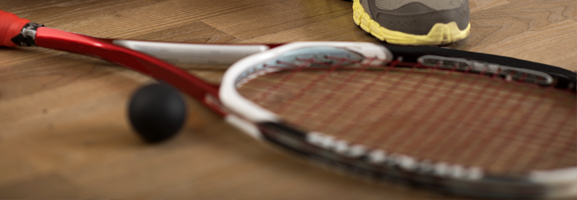Guide to Squash Rackets
Choosing the right squash racket will affect your performance on the squash court, so it's essential to make the right choice.

Newitts sells a wide range of squash rackets to suit all abilities, so whether you are a beginner squash player or a more advanced player, you should be able to find the right racket to suit.
If you are a beginner squash player, the main things to consider are the cost, the head shape and the weight of your squash racket. You shouldn't be looking to pay more than around £30-60.
It is strongly advised that you test a squash racket out on the court before you buy. Follow our guide below to help narrow down the best frames to suit your style of play.
Head size
The bigger the head of a squash racket, the larger the sweetspot. A larger head size is better suited to beginner squash players because it is more forgiving on shots that haven't come right out of the middle of the racket, in other words there is more margin for error and bad shots may turn out better than they should actually be. Small headed squash rackets are best suited to more experienced squash players. Smaller sweetspots offer more advanced players better control and power over the ball.
Weight
Different rackets have different weights to suit a variety of styles and preferences of play. Squash rackets generally weigh between 110-190 grams, but it's important to note that the weights marked on the racket frames are usually the unstrung weights, so you can expect the actual racket to weigh a few grams more once the paint, grommets and grip have been added.
Light rackets - are easy to handle and manoeuvre quickly so the player can really feel the ball and achieve the most accurate placement of shots. Light rackets are often the choice for junior squash players and female players who want to play with a full size racket without being weighed down, but they are actually better suited to more skilled squash players as the player needs to be able to generate enough power for the shot.
Heavier rackets - suited to squash players who have a slower swing. A heavier frame will suit squash players who wish to focus on the power, length and retrieving style of play.
Balance
A squash racket can feel lighter or heavier to a player depending on its balance. Rackets can be head-light, head-heavy or evenly balanced and its usually a question of personal preference as to which racket is best suited to which player.
Head-light rackets - are better suited to touch and volleying squash players, but they can be harder to control at speed.
Head-heavy rackets - are traditionally better suited to professional squash players as they can be easier to control, but with squash evolving into a more fast paced, attacking game, more pros are opting for head-light frames.
Strings
Squash rackets come with different types of strings with varying string tensions which can make a huge difference to the way the squash rackets play. Higher quality strings will offer more grip and feel on the ball but they are not necessarily as durable. One misconception is that a higher string tension gives greater power, but it is in fact the reverse. A higher string tension will provide less power but will increase control. Factory settings are quite basic with most rackets strung at 26-28lbs, so more advanced players may choose to upgrade to a custom restring.
